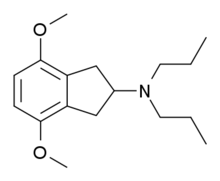RDS-127
From Wikipedia, the free encyclopedia
 |
|
 |
|
| Clinical data | |
|---|---|
| ATC code |
|
| Identifiers | |
|
|
| CAS Number | |
| PubChem CID | |
| ChemSpider | |
| Chemical and physical data | |
| Formula | C17H27NO2 |
| Molar mass | 277.402 g/mol |
| 3D model (Jmol) | |
|
|
|
|
| |
|
RDS-127 is a drug which is used in scientific research. It acts as a D2-like receptor agonist[1] and also has some serotonin and adrenergic agonist effects,[2][3][4][5] as well as some anticholinergic action,[6][7] and produces both anorectic and pro-sexual effects in animal studies.[8][9]
See also[edit]
References[edit]
- ^ Arnerić SP, Long JP, Williams M, et al. (January 1983). "RDS-127 (2-di-n-propylamino-4,7-dimethoxyindane): central effects of a new dopamine receptor agonist". The Journal of Pharmacology and Experimental Therapeutics. 224 (1): 161–70. PMID 6401334.
- ^ Arnerić SP, Roetker A, Long JP, Mott J, Barfknecht CF (June 1982). "Effects of semirigid methoxamine analogs on vascular smooth muscle: studies of methoxy-2-aminotetralin and 2-aminoindane derivatives". Archives Internationales de Pharmacodynamie et de Thérapie. 257 (2): 263–73. PMID 7114973.
- ^ Arnerić SP, Long JP (May 1984). "Evidence that a novel dopamine receptor agonist, RDS-127 [2-di-n-propylamino-4,7-dimethoxyindane] has some centrally mediated cardiovascular actions". The Journal of Pharmacy and Pharmacology. 36 (5): 318–21. doi:10.1111/j.2042-7158.1984.tb04382.x. PMID 6145768.
- ^ Clark JT, Smith ER (1986). "Failure of pimozide and metergoline to antagonize the RDS-127-induced facilitation of ejaculatory behavior". Physiology & Behavior. 37 (1): 47–52. doi:10.1016/0031-9384(86)90382-3. PMID 3737722.
- ^ Rezaki YE, Ilhan M (1991). "Evaluation of alpha-adrenoceptor agonistic activity of RDS-127 (2-di-n-propylamino-4,7-dimethoxyindane) in rabbit and rat aortae". Archives Internationales de Pharmacodynamie et de Thérapie. 310: 76–86. PMID 1685313.
- ^ Sahin I, Ilhan M (1988). "The antimuscarinic activity of a dopamine receptor agonist (RDS-127) differentiates M2-muscarinic receptors of heart, ileum and trachea in guinea-pig". Archives Internationales de Pharmacodynamie et de Thérapie. 296: 163–72. PMID 2907277.
- ^ Sahin I, Tuncer M, Ilhan M (March 1990). "Dopamine receptor agonists, N,N-dipropyl-2-aminotetralin (TL-68) and 2-di-n-propylamino-4,7-dimethoxyindane (RDS-127) antagonize oxotremorine-induced tremors by antimuscarinic action in mice". Archives Internationales de Physiologie et de Biochimie. 98 (1): 7–9. doi:10.3109/13813459009115730. PMID 1692697.
- ^ Arnerić SP, Roetker A, Long JP (September 1982). "Potent anorexic-like effects of RDS-127 (2-di-n-propylamino-4,7-dimethoxyindane) in the rat: a comparison with other dopamine-receptor agonists". Neuropharmacology. 21 (9): 885–90. doi:10.1016/0028-3908(82)90080-6. PMID 6897285.
- ^ Kwong LL, Smith ER, Davidson JM, Peroutka SJ (October 1986). "Differential interactions of "prosexual" drugs with 5-hydroxytryptamine1A and alpha 2-adrenergic receptors". Behavioral Neuroscience. 100 (5): 664–8. doi:10.1037/0735-7044.100.5.664. PMID 2877677.